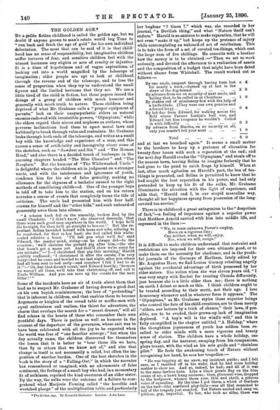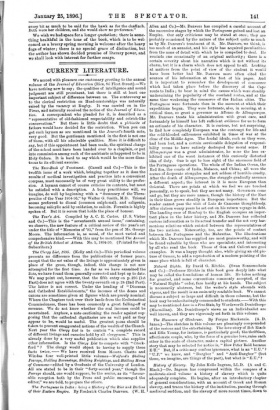THE GOLDEN AGE.*
BY a polite fiction childhood is called the golden age, but we doubt if anyone grown to man's estate would beg Time to " run back and fetch the age of gold" for his own individual
delectation. The most that can be said of it is that child- hood has no sense of responsibility, but imaginative children suffer tortures of fear, and sensitive children feel with the utmost keenness any slights or acts of cruelty or injustice- It is a time of hopefulness and of vague aspirations, of looking out into a world magnified by the telescope of imagination; older people are apt to look at childhood through the reverse end of the telescope, and to lose the sense of proportion when they try to understand the small
figures and the limited horizons that they see. We are a
little tired of the child in fiction, but these papers record the doings of a group of children with much humour and generally with much truth to nature. These children being deprived of what Mr. Grahame calls a " proper equipment of parents," look on their unsympathetic elders as natural enemies endowed with irresistible powers, " Olympians;" while the elders regard their nieces and nephews as outlaws, whose perverse inclinations lead them to upset moral laws and habitually to break through rules and restraints. Mr. Grahame looks through both ends of the telescope, and writes as a small boy with the knowledge and experience of a man, and this causes a sense of artificiality and incongruity about some of the sketches, such as " Sawdust and Sin " and .` The Roman Road," and also there is a decided touch of burlesque in the amusing chapters headed "The Blue Chamber" and "The Burglars." But the humour of "The Whitewashed Uncle " is delightful where the children sit in judgment on a stranger nude, and with the intolerance and ignorance of youth, condemn him for his air of false geniality, making no allowance for the shyness of a bachelor unused to the right methods of conciliating childhood. One of the younger boys is told off to take him to the station, and on his return narrates a course of events that completely turns the tide of criticism. The uncle had presented him with four half- crowns for himself and the "other kids," and such unheard-of generosity awes them into silence.
" A solemn hush fell on the assembly, broken first by the small Charlotte. I didn't know,' she observed dreamily, ' that there were such good men anywhere in the world. I hope he'll die to-night, for then he'll go straight to heaven !' But the re- pentant Selina bewailed herself with tears and sobs, refusing to be comforted, for that in her haat?, she had called this white-
souled relative a beast. tell you what we'll do,' said Edward, the master mind, rising—as he always did—to the occasion ; we'll christen the piebald pig after him,—the one that hasn't got a name yet. And that'll show we're sorry for our mistake ! I—I christened that pig this morning,' Harold guiltily confessed ; I christened it after the curate, I'm very sorry—but he came and bowled to use last night., after you others had all been sent to bed early—and somehow I felt I had to do it ! Oh, but that doesn't count,' said Edward hastily; because we weren't all there, we'll take that christening off, and call it Uncle William. And you can save up the curate for the next litter ! ' "
Some of the incidents have an air of truth about them that lead us to suspect Mr. Grahame of having drawn a good deal on his own boyish reminiscences ; the love of "pretending" that is inherent in children, and that enables them to become Argonauts or knights of the round table or muffin-men with equal enthusiasm and realism, the thirst for adventure, the charm that overlays the search for a " secret drawer," will all find echoes in the hearts of those who remember their own youthful days. There is pathos as well as humour in the account of the departure of the governess, whose exit was to
have been celebrated with all the joy to be expected when the world was free of " one familiar scourge ; " but when the day actually came, the children discovered for themselves the lesson that it is better to " bear those ills we have,
than fly to others that we know not of," and also that change in itself is not necessarily a relief, but often the im- position of another burden. One of the best sketches in the baok is the story of a " Falling-Out," in which the narrator has remembered or imagined, with no adornments of false sentiment, the feelings of a small boy who had, in a momentary fit of sulkiness, repulsed the kind overtures of an elder sister. By the way, the sulks were the outcome of a failure to com- prehend what Marjorie Fleming called " the horrible and wretched plaege " of the multiplication table, and particularly
• The Golden Age. By Kenneth Grahame. London: Juhn 1.31:113. her bugbear " 7 times 7," which was, she recorded in her journal, "a Devilish thing," and what "Nature itself can't endure." Harold is so anxious to make reparation, that he will not even " make it up," but keeps up the pretence of injury while contemplating an unheard-of act of retribution. This is to take the form of a set of coveted tea-things, which cost the large sum of five shillings. He consults with a brother how the money is to be obtained :—" Then we set to work seriously, and devoted the afternoon to a realisation of assets and the composition of a budget that might have been dated
without shame from Whitehall. The result worked out as follows:—
By one uncle, unspent through having been lost s. d.
for nearly a week,—turned up at last in the straw of the dog-kennel ... 2 6 By advance from me on security of next uncle, and failing that, to be called in at Christmas ... 1 0 By shaken out of missionary-box with the help of a knife-blade. (They were our own pennies and a forced levy)... 0 4 By bet due from Edward, for walking across the field where Farmer Larkin's bull was, and
Edward bet him twopence be wouldn't. Called in with difficulty 0 2 By advance from Martha, on no security at all, only you mustn't tell your aunt ... ... 1 0
Total 5 0
and at last we breathed again." It seems a small matter to the brothers to keep up a pretence of alienation for
twenty-four hours with such a reparation at the end; and the next day Harold evades the "Olympians," and steals off to the nearest town, leaving Selina to imagine forlornly that he had gone to the pond to catch frogs by himself. When at last, after much agitation on Harold's part, the box of tea- things is presented, and Selina is permitted to know that he had sought the best reparation in his power, and had only pretended to keep up his fit of the sulks, Mr. Grahame
illuminates the situation with the light of experience, and adds that, "Harold and I, in our stupid masculine way, thought all her happiness sprang from possession of the long- coveted tea-service."
There is in childhood a great antagonism to the " despotism of fact,"—a feeling of impotence against a superior power that Matthew Arnold carried with him into middle life, and expressed in the lines r-
" We, in some unknown Power's employ, Move on a rigorous line;
Can neither, when we will, enjoy, Nor, when we will, resign."
It is difficult to make children understand that restraint and restrictions are imposed for their own ultimate good, or to
make them see the necessity for obedience, and in the youth. ful journals of the Gurneys of Earlham, lately edited by Mr. Augustus Hare, we find Louisa Gurney rebelling angrily against the accidental advantage of birth possessed by her elder sisters. She writes when she was eleven years old, "I was very angry with Rachel for treating Chenda differently, just because she is a little older than me ; there is nothing on earth I detest so much as this. I think children ought to
be treated according to their merit, not their age. I love democracy whenever and in whatever form it appears." The " Olympians," as Mr. Grahame styles those superior beings
who control the fate of his child-creations, are to them merely "elders, our betters by a trick of chance," their laws, if pos- sible, are to be evaded, their grown-up lack of imagination deplored. " A boy's will is the wind's will," and this is fully exemplified in the chapter entitled "A Holiday," where the thoughtless joyousness of youth has seldom been re- called to older minds with a more vigorous and breezy sense of elation. The children have a whole holiday, one
spring day, and the narrator, escaping from his companions, plays truant, with the wind as his sole guide and " chainless pilot." He feels the awakening touch of Nature without recognising her hand, he sees her tragedies :— " He was tugging at me anew, my insistent guide ; and I felt sure, as I rambled off in his wake, that he had more holiday matter to show me. And so. indeed, he bad; and all of it was to the same lawless tune. Like a black pirate flag on the blue ocean of air, a hawk hung ominous; then, plummet-wise, dropped to the hedgerow, whence there rose, thin and thrill, a piteous voice of squealing. By the time I got there, a whisk of feathers on the turf—like scattered play-bills—was all that remained to tell of the tragedy just enacted. Yet Nature smiled and sang on, pitiless, gay, impartial. To her, who took no sides, there was
every bit as much to be said for the hawk as for the chaffinch. Both were her children, and she would show no preference."
We wish we had space for a longer quotation ; there is some- thing healthful in the tone of the book, which is to be wel- comed as a breezy spring morning is welcome after the heavy fogs of winter; there is no special grace of distinction, but the author has shown decided promise of literary power, and we shall look with interest for further essays.



















































 Previous page
Previous page